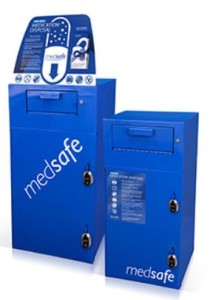- FBI Recognizes Pharmacy Students for Generation Rx Work (pharmacytimes.com)University of New Mexico College of Pharmacy Receives FBI Director’s Community Leadership Award (fbi.gov)
The FBI has bestowed the Community Leadership Award to the University of New Mexico College of Pharmacy’s Generation Rx chapter in honor of its students’ work to fight prescription drug abuse...the student-led initiative is geared toward educating the community on the use and abuse of prescription medications. Its main goal is to provide accurate information and resources in order to help decrease the number of fatal drug overdoses...The students accomplish these goals by providing presentations to different groups in the community and promoting National Prescription Drug Take-Back Days in collaboration with local pharmacies, the Drug Enforcement Administration, and the New Mexico Board of Pharmacy. They also hand out prescription drug use and abuse information, plus stickers and magnets, at health fairs and other events...The FBI recognized the school’s chapter both in Albuquerque, New Mexico, and Washington, DC. Perea (Nicole Perea, 2017 PharmD candidate) accepted the award from FBI Director James Comey on behalf of the University of New Mexico team.
- Drug diversion: Collaboration is key to detection, control (drugtopics.modernmedicine.com)
Diversion of controlled substances in the hospital setting can be detected with relative ease using current auditing software. But to confirm and correct diversion calls for close collaboration between pharmacy and nursing...The risks of diversions are not only to our patients, but to our employees and our institutions...Detecting diversion and addressing the problem calls for a collaborative process, with buy-in and investment from all stakeholders. Diversion is not just a pharmacy issue...Uncovering drug diversion clearly needs nursing support...the cost of diversion is more than just the dollar value. There is the erosion of reputation. The perception that diversion is easy at an institution is likely to lead to greater diversion...
- DEA eases requirements for natural cannabis-derived drug research (reuters.com)
Drug Enforcement Administration...relaxed some restrictions on research evaluating cannabidiol, an extract of the marijuana plant, for medicinal use...The modifications will ease some requirements imposed by the Controlled Substances Act on possession of cannabidiol (CBD) for a specific Food and Drug Administration approved research protocol...researchers who expanded the scope of their studies and required more CBD than initially approved had to request, in writing... the changes...a previously registered CBD clinical researcher who is granted a waiver can readily modify the protocol and continue research seamlessly. (waiver effectively removes a step from the approval process)...A handful of companies are developing cannabis-derived drugs. Pioneering the effort is Britain's GW Pharmaceuticals, which is slated next year to deliver the results of four late-stage U.S. studies of its botanical pot-based epilepsy treatment...INSYS Therapeutics Inc and Zynerba Pharmaceuticals Inc are working on much earlier stages of development with synthetic cannabis for a number of disorders.
- Pharmacies Settle with Feds for Narcotics Mishandling (pharmacytimes.com)
A group of San Diego, California, pharmacies and their owners have paid $750,000 to the federal government to resolve drug diversion claims…pharmacies had been accused of mishandling prescription narcotics and ephedrine/pseudoephedrine products…The settlement was with Park Medical Pharmacy Inc…and owners Joseph Grasela and John Grasela…Drug Enforcement Administration alleged that the pharmacies had violated the Controlled Substances Act by diverting a “significant” amount of controlled substances, not taking adequate inventory of controlled substances, and not maintaining records of the pharmacies’ distribution of products.
- Federal Reclassification of Marijuana Could Have Major Impact on Medical Uses (abcnews.go.com)
Federal authorities have announced that they are reviewing the possibility of loosening the classification of marijuana, and if this happens, it could have a far-reaching impact on how the substance is used in medical settings...Marijuana is currently classified as a Schedule I drug, meaning it is listed alongside heroin and LSD as among the "most dangerous drugs" and has "no currently accepted medical use and a high potential for abuse."...The Drug Enforcement Administration announced last week that it is reviewing the possibility of reclassifying it as a Schedule II drug, which would put it in the same category as Ritalin, Adderal and oxycodone...There are thousands of people who are using medical marijuana for a whole host of medical conditions...where the efficacy has yet to be thoroughly studied...By changing the classification of the drug...researchers and doctors could find out how effective marijuana is in other conditions...We could move toward a more evidence-based use of medical marijuana... For too long schedule I status for marijuana has been a barrier for necessary research...
- Walgreens launches two programs to help address opioid abuse (drugstorenews.com)DEA Administrator Chuck Rosenberg Statement on Walgreens’ Prescription Drug Take Back Initiative (dea.gov)
Walgreens...announced the launch of a new effort to combat drug abuse, introducing two programs that address contributors to the crisis.
- ...Walgreens will install safe medication disposal kiosks in more than 500 drug stores in 39 states and Washington, D.C., primarily at locations open 24 hours. The program will make the disposal of medications — including opioids and other controlled substances — easier and more convenient while helping to reduce the misuse of medications and the rise in overdose deaths.
- Walgreens also will make naloxone...available without a prescription at its pharmacies in 35 states and Washington, D.C., rolling out the program state-by-state throughout this year.
- Reefer Gladness? DEA OKs Catalent to supply marijuana from Missouri plant (in-pharmatechnologist.com)
Catalent has registered a facility in Missouri with the DEA to import cannabis extracts in dosage form for clinical trial studies…The contract development and manufacturing organisation applied for its Kansas City...site to be registered as an importer of controlled substances in August, and last week the Drug Enforcement Administration approved the request…“[Catalent Pharma Solutions] is granted registration as an importer of marihuana, a basic class of controlled substance listed in schedule I,”…“The company plans to import finished pharmaceutical products containing cannabis extracts in dosage form for clinical trial studies.”..One of Catalent’s customers is GW Pharmaceuticals which has a marijuana-based compound, Epidiolex (cannabidiol), in Phase III trials for the treatment of Lennox-Gastaut syndrome…The company ships finished product to a storage facility run by Catalant in the US and investigators draw material from that facility,”
- Drug Disposal Kiosks Help Hospitals Serve Their Community (ashp.org)
Patients who need to dispose of unwanted controlled substances and other medications are embracing the convenience of drug disposal kiosks managed by their local health-system pharmacies..."We've collected a little over two tons, in the last year, of unwanted medications," said Buck Stanford, community pharmacy operations director for Intermountain Healthcare...all 25 of Intermountain Healthcare's community pharmacies have a way for patients to dispose of their medicines...Kristina McGill...at Beth Israel Deaconess Hospital...fall became the second in Massachusetts to set up a drug disposal kiosk and the first to install one outside of the pharmacy...Both health systems obtained their kiosks, known as MedSafe units, from Sharps Compliance Inc....The steel kiosks are double padlocked and contain an inner receptacle consisting of sturdy inner and outer cardboard boxes plus plastic liners and absorbent pads. The inner boxes double as a shipping container for sending the medications away for incineration...The Drug Enforcement Administration in...2014 implemented a regulation that allows pharmacies and other healthcare entities to register as collection sites for controlled substances and other unwanted medications...as of February 29, a total of 882 DEA registrants had been designated as collectors...ASHP policy 0614, Safe Disposal of Patients' Home Medications, encourages pharmacists to develop patient-oriented medication disposal options that minimize the risk of accidental poisoning, drug diversion, and adverse effects on the environment...
- “Pill Mill” Doctor Pleads Guilty to Drug Distribution and Money Laundering Charges (dea.gov)
Drug Enforcement Administration...announced...Dr. Francisco Huidor-Figureoa, 48, a physician...Montgomery, Alabama, pleaded guilty...to one count of conspiring to distribute oxycodone and one count of conspiring to commit money laundering...During the plea hearing...Figureoa admitted that he worked...a “pill mill.”...was the sole physician employed by the EMED Medical Management Corporation...in Opelika, Alabama...Figureoa sold oxycodone to pill dealers, based on a fraudulent prescription...knew that the recipients of these illegal pills did not need the medicine and that the recipients intended to either abuse the pills or sell the pills to others who would abuse them...Figueroa faces up to 20 years’ imprisonment on each count...Additionally, on the drug distribution conspiracy count...faces a maximum fine of $1,000,000. On the money laundering conspiracy count, the maximum fine...could be...$500,000, or twice the value of the property involved in the transaction, whichever is greater.
- Southampton Town Councilman Pleads Guilty to Conspiring to Illegally Distribute Oxycodone (dea.gov)
Bradley Bender, Southampton Town Councilman, pleaded guilty today to conspiring to illegally distribute oxycodone…Bender received phony prescriptions for oxycodone from a Riverhead physician assistant, Michael Troyan, filled those prescriptions, and illegally exchanged the oxycodone pills for cash and steroids with another co-conspirator. The oxycodone pills were then re-sold to drug abusers…“Councilman Bender’s actions in this oxycodone distribution conspiracy victimized the very community he was entrusted to represent…guilty plea should serve as a reminder that no one is above the law, including those entrusted with passing our laws.”








